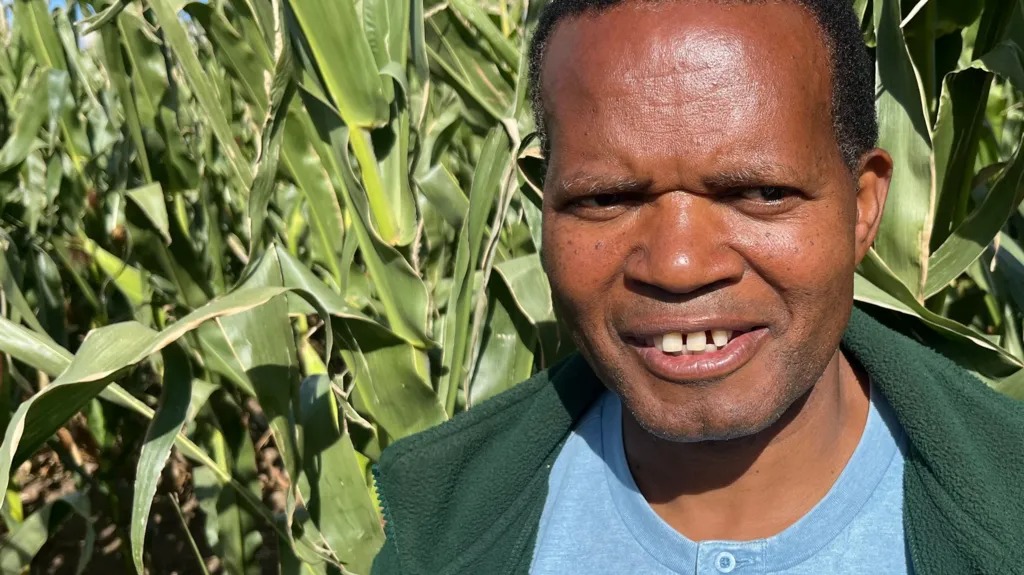Rex Mphisa
A Zimbabwean farmer, who missed sadza so much when he went to the United Kingdom, started growing white maize after struggling to find the staple crop he ate while growing up, was visited by the Princess Royal.
David Mwanaka, 60, moved to the UK from Zimbabwe more than 20 years ago and started growing traditional Zimbabwean vegetables on an allotment.
Demand for the produce grew, and he later secured 500 acres of land in Landbeach, Cambridgeshire, where people travelled from across the UK to visit.
“I was the first farmer to grow white maize in the country, for a single reason, because I wanted to eat white maize,” said Mr Mwanaka, who said it had a short shelf life, so could not be imported.
John Devine/BBC A horned melon, also known as kiwano, is shown resting on a light-colored surface. The fruit has a striking and unusual appearance: its skin is green with yellow patches and decorated with lighter green speckles. Covering the surface are evenly spaced, sharp-looking spikes that give it a horned texture, almost like a small, spiky alien fruit. John Devine/BBC
Mr Mwanaka grows and sells white maize, along with other exotic crops like horned melon (pictured) and pumpkin leaves
He started growing produce in Enfield, north London, before securing a farm tenancy with Cambridgeshire County Council in 2022.
Mr Mwanaka now has almost 500 acres of land where he grows white maize, along with other exotic crops like horned melon and pumpkin leaves.
“[White maize corn] has a very short shelf life, just one day, so you can’t import it from another country,” he said.
“That’s why I started growing it in this country.
“We have people come from all over for white maize, as far down as Bournemouth and some from Scotland. We also do a delivery service.”
John Devine/BBC Perpetual Gumbo is standing inside a grocery shop on the farm. She is wearing a white zip-up jacket and has a black strap across her shoulder, possibly from a bag. She is smiling warmly at the camera. Behind her, shelves are filled with green trays holding packaged food items, including dried goods and fresh produce. To the right, there’s a refrigerated section stocked with drinks, including brightly coloured cans and bottles from Zimbabwe.John Devine/BBC
Perpetual Gumbo travelled to the farm shop from Chatham in Kent, which took almost two hours
Perpetual Gumbo,19, has driven to the farm shop from Chatham in Kent.
“It took us like two hours to get here,” she said.
“White maize is so iconic and I can’t get it like this anywhere else… straight from the farm.
“It feels like you’re in Zimbabwe, it takes you straight home.”
Christine Chimhuka, 31, travelled to the shop from New Malden in London and made the trip up about three times during the summer months.
“I found it through Facebook about 10 years ago, so I’ve been coming here since then,” she said.
“Every year, we can’t wait. I’m always calling and asking when it is ready. I told my family I’m coming… they have sent their orders through from WhatsApp.”
Cambridgeshire County Council A group of six people are walking together along a dirt path in an outdoor setting, possibly a farm or rural site. In the foreground, Princess Anne is dressed smartly in a beige blazer and brown trousers, carrying a handbag and walks beside David and Brenda, wearing green jackets with name badges. David is speaking and gesturing with his hands. Behind them, three more people follow at a short distance. Parked nearby are a black SUV and another vehicle, with fencing and construction materials visible in the background. Cambridgeshire County Council
Princess Anne met David Mwanaka and his wife Brenda
Princess Anne visited the farm on 19 September and planted a peach tree to mark the occasion.
Mr Mwanaka thanked her for supporting farming, and he spoke about the importance of encouraging young people into the industry.
“It was really a highlight of my career to have her come to encourage, support and watch,” he said.
“She is so down to Earth, I couldn’t believe it.”
The staple food of Zimbabwe where Mwanaka comes from is Sadza, a thick porridge made from ground maize (corn) meal.
This versatile dish serves as a foundation for many meals, accompanying various relishes such as vegetables, meat, and fish, and is often eaten with the hands from a communal bowl, symbolizing togetherness…. source BBC


